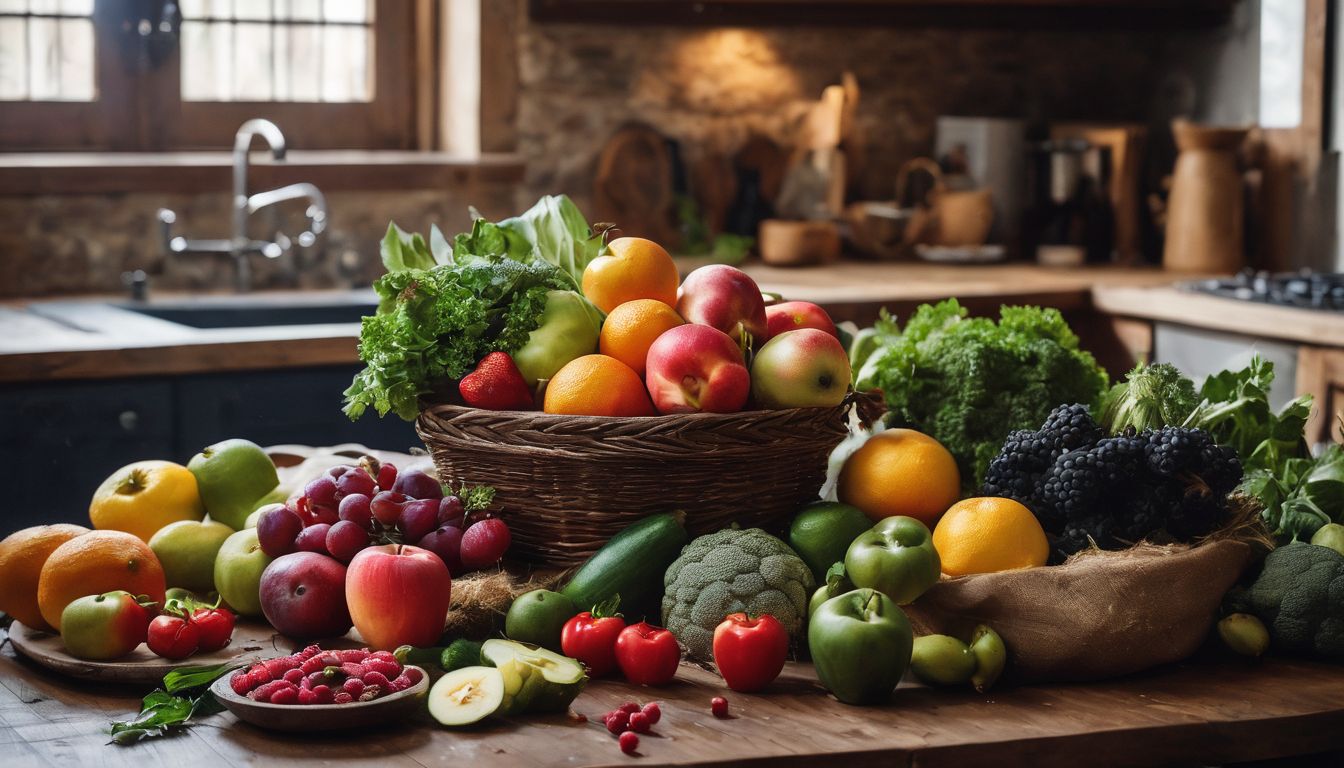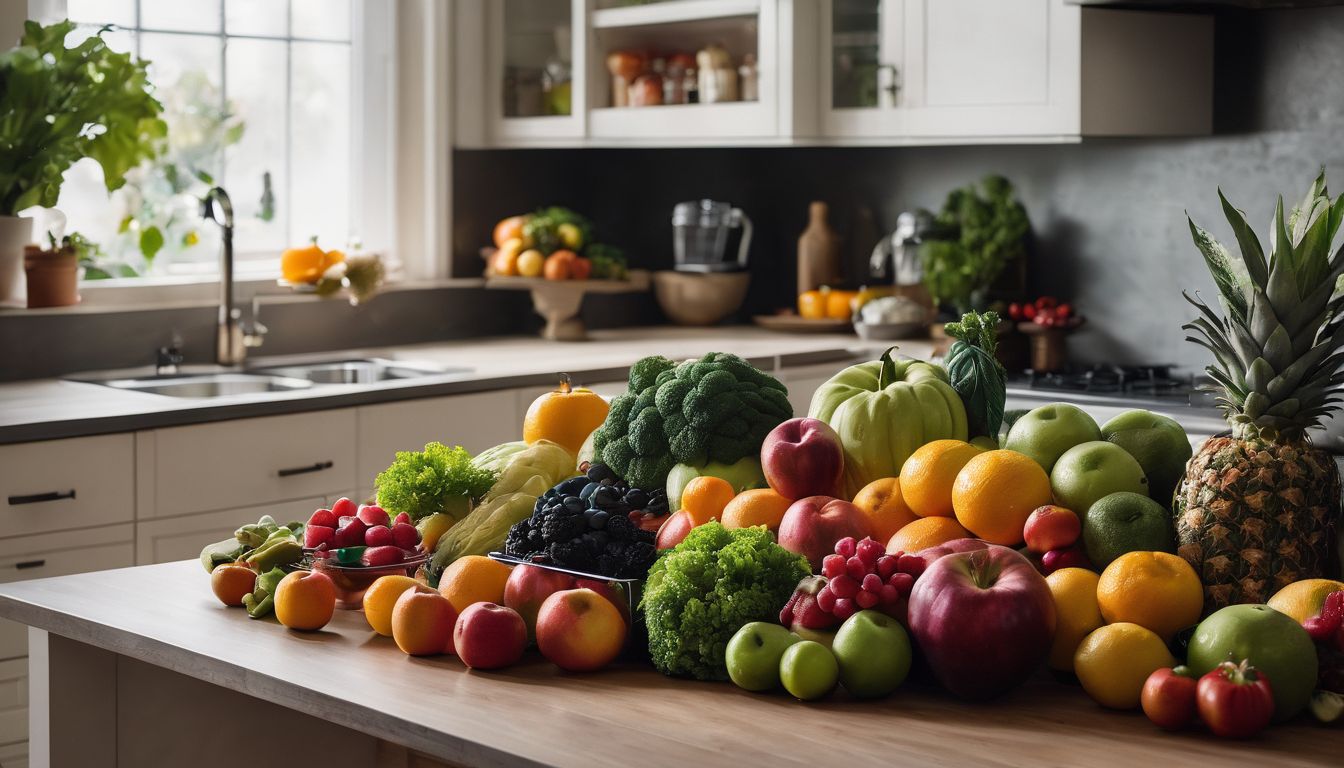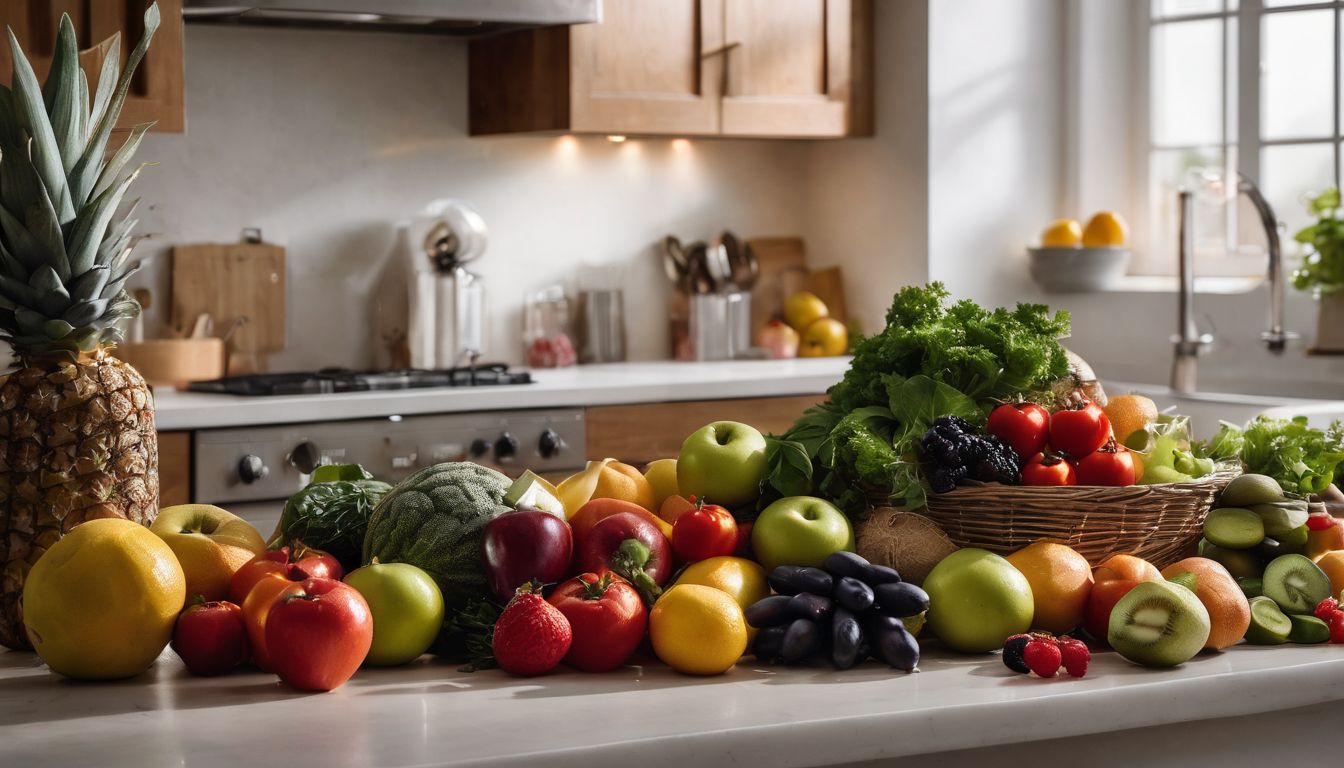Struggling with high blood pressure can be worrying. It’s a condition that affects one in four adults in the UK, according to NHS statistics. This blog lays out simple, practical strategies to help you take control of your blood pressure naturally.
Discover how small changes make big differences!
Key Takeaways
- Engaging in at least 150 minutes of moderate exercise each week, like walking or swimming, strengthens the heart and lowers blood pressure.
- Eating a balanced diet rich in fruits, vegetables, whole grains, and lean proteins while reducing salt and sugar intake is key to managing high blood pressure.
- Simple adjustments such as increasing potassium intake with foods like bananas and spinach can balance electrolytes and support healthy blood levels.
- Techniques for stress management including yoga and deep breathing exercises play a critical role in controlling hypertension effectively without medication.
- Lifestyle changes are not always sufficient; when necessary, consult healthcare professionals about prescription medications to manage severe high blood pressure.
Understanding High Blood Pressure
High blood pressure, also known as hypertension, is a condition in which the force of the blood against the artery walls is consistently too high. This can lead to serious health complications such as heart disease, stroke, and kidney failure.
Understanding the factors that contribute to high blood pressure and how it affects the body is crucial for managing this condition effectively.
The importance of managing high blood pressure
Keeping your blood pressure in check is crucial for preventing heart attacks and strokes, which are serious health events that can significantly shorten life and impact quality of living.
Consistent management of high blood pressure helps protect vital organs like the brain, heart, and kidneys from damage. It’s akin to maintaining a healthy ecosystem; just as balance in nature supports conservation efforts, balanced blood pressure supports overall body health.
Taking steps to lower high blood pressure doesn’t just benefit your personal wellbeing; it also aligns with environmentally conscious values by reducing reliance on medication production and waste.
Adopting lifestyle changes such as improved diet and regular exercise contributes to both a healthier you and a reduced ecological footprint. By managing hypertension through natural remedies and smart dietary choices, individuals play an active role in their own health while supporting broader environmental goals.
Factors that contribute to high blood pressure
Understanding the factors that contribute to high blood pressure is crucial for making informed lifestyle choices. Here are the key factors to consider:
- Excessive salt intake: Consuming too much salt can lead to fluid retention, putting a strain on the heart and increasing blood pressure.
- Sedentary lifestyle: Lack of physical activity can lead to weight gain and increase the risk of hypertension.
- Poor diet: Diets high in processed foods, sugar, and saturated fats can contribute to high blood pressure.
- Stress: Chronic stress can elevate blood pressure levels over time.
- Genetics: Family history of hypertension can increase the likelihood of developing high blood pressure.
- Age: As individuals get older, the risk of developing high blood pressure increases.
How high blood pressure affects the body
High blood pressure puts strain on the arteries, causing them to become narrower and less flexible. This can lead to an increased risk of heart disease, stroke, and other serious health issues.
It also puts a burden on the heart as it works harder to pump blood throughout the body.
Over time, high blood pressure can cause damage to organs such as the kidneys and eyes. It is crucial for environmentally conscious individuals to manage their blood pressure effectively in order to protect their long-term health and well-being.
Lifestyle Changes to Lower High Blood Pressure
– Regular exercise is essential for lowering high blood pressure, as it helps to strengthen the heart and improve blood flow throughout the body.
– Maintaining a healthy weight through proper diet and exercise can help reduce the strain on the heart and lower high blood pressure.
Exercise regularly
Engage in regular physical activity to help manage high blood pressure. Activities like brisk walking, cycling, or swimming can improve your heart health and lower blood pressure. Aim for at least 150 minutes of moderate-intensity exercise each week.
Be sure to incorporate strength training exercises into your routine as well.
To maintain a healthy weight and reduce the risk of hypertension, make exercise a part of your daily habits. Physical activity is an effective way to control high blood pressure without medication while also benefiting the environment by reducing carbon emissions from cars when walking or biking instead of driving.
Maintain a healthy weight
To lower high blood pressure, maintaining a healthy weight is essential. Being overweight adds extra strain on the heart, leading to high blood pressure and other cardiovascular issues.
Strive for a balanced diet rich in fruits, vegetables, whole grains, lean proteins, and healthy fats to manage your weight effectively without compromising your health.
Regular physical activity combined with a well-rounded diet helps to reach and maintain a healthy weight. It’s also beneficial for overall well-being and can significantly reduce the risk of developing hypertension.
Reduce sugar and refined carbohydrate intake
Cutting down on sugar and refined carbohydrates can significantly help manage high blood pressure. These foods can cause spikes in blood sugar levels, leading to increased strain on the heart and blood vessels.
By swapping sugary snacks for whole fruits and opting for whole grains over refined products, it’s possible to reduce the risk of hypertension. Embracing this dietary change also supports environmental sustainability by encouraging more sustainable agricultural practices, such as organic fruit farming and eco-friendly grain cultivation.
Increasing awareness about the effects of high sugar intake not only benefits personal health but also promotes environmentally friendly food choices, aligning with conservation values.
Increase potassium and decrease salt intake
To reduce high blood pressure, it’s essential to increase potassium and decrease salt intake. This helps to balance the body’s electrolytes, which in turn supports healthy blood pressure levels. Here are some effective ways to achieve this:
- Choose potassium – rich foods such as bananas, sweet potatoes, spinach, and avocados. These foods not only provide ample potassium but also offer various other nutrients that support overall health.
- Replace table salt with herbs and spices to season your food. This reduces the overall sodium intake while adding flavour to your meals.
- Opt for low-sodium or no-added-salt versions of canned vegetables, soups, and sauces when grocery shopping.
- Experiment with using lemon juice, vinegar, or citrus zest in recipes instead of adding extra salt for added taste.
- When eating out at restaurants, request dishes to be prepared with minimal or no added salt.
Dietary Strategies for Lowering High Blood Pressure
Follow a heart-healthy diet by including plenty of fruits, vegetables, whole grains, and lean proteins. Limit processed foods and focus on consuming foods low in saturated fat and cholesterol.
Following a heart-healthy diet
A heart-healthy diet includes plenty of fruits, vegetables, whole grains, and lean proteins. It’s essential to limit saturated fats and trans fats found in processed foods and opt for healthier fats like those in nuts, seeds, and avocados.
Incorporating omega-3 fatty acids from sources such as salmon or flaxseeds can also benefit heart health. Additionally, reducing sodium intake by choosing fresh foods over processed ones helps manage blood pressure.
Embracing a plant-based diet can be advantageous for the environment as well since it often involves consuming more sustainable food options with lower environmental impacts.
Incorporating local and seasonal produce into your meals not only supports sustainability but also provides a variety of nutrients that contribute to overall cardiovascular health.
Limiting processed foods
Cutting back on processed foods can significantly help in managing high blood pressure. By reducing the intake of processed foods, individuals can lower their sodium and sugar consumption, both of which are linked to hypertension.
Opt for fresh fruits, vegetables, whole grains, lean proteins, and healthy fats instead. This not only supports your overall health but also contributes positively to environmental sustainability by reducing packaging waste and supporting local produce.
Making this simple dietary switch is an effective step towards naturally controlling blood pressure.
Choosing whole foods over heavily processed options will not only benefit your health but also align with environmentally conscious values by supporting sustainable agriculture and minimising the carbon footprint associated with highly processed food production and transportation.
Quitting or avoiding smoking
To further support your blood pressure management and environmental efforts, consider quitting or avoiding smoking. Tobacco smoke harms the body’s blood vessels, making it harder for them to transport oxygen and nutrients effectively.
By reducing exposure to smoke, you can help maintain healthy blood pressure levels and contribute to a cleaner environment through decreased air pollution.
By eliminating tobacco smoke from your life, you not only promote better heart health but also join the cause of protecting our planet’s air quality. This small change will have a positive impact on both your well-being and the environment around you.
Managing stress
After quitting or avoiding smoking, another important nonmedication strategy for managing high blood pressure is stress management. Chronic stress can lead to elevated blood pressure levels, so incorporating stress-reducing techniques into your daily routine is crucial.
Engaging in activities like yoga, meditation, deep breathing exercises, and spending time in nature can help lower stress levels and ultimately contribute to managing hypertension effectively.
Making time for relaxation and self-care is essential for reducing the impact of stress on your blood pressure. A balanced approach that includes regular physical activity, a healthy diet, adequate sleep, and effective stress management techniques can significantly improve your overall well-being and contribute to better blood pressure control without relying solely on medication.
Natural Remedies for Lowering High Blood Pressure
Incorporating natural remedies such as dark chocolate, medicinal herbs, quality sleep, and garlic can help in lowering high blood pressure. To learn more about these effective strategies for managing hypertension without medication, keep reading!
Dark chocolate and medicinal herbs
Enjoy the benefits of dark chocolate and medicinal herbs as part of your natural approach to lowering high blood pressure. Dark chocolate contains flavonoids, which may help relax blood vessels and improve blood flow, which in turn can have a positive effect on managing hypertension.
Additionally, certain medicinal herbs like hawthorn, garlic, and basil have been traditionally used to support cardiovascular health by helping to lower blood pressure naturally. Incorporating these into your diet can be a tasty way to work toward better heart health without medication.
When seeking alternative methods for maintaining healthy blood pressure levels, consider the power of dark chocolate and medicinal herbs as part of your holistic approach to wellness.
Getting quality sleep
To complement the benefits of dark chocolate and medicinal herbs, getting quality sleep is essential for managing high blood pressure naturally. Adequate sleep contributes to regulating stress hormones, which in turn helps to maintain healthy blood pressure levels.
Establishing a consistent bedtime routine and creating a tranquil sleeping environment are crucial for promoting restful sleep. Engaging in relaxation techniques such as deep breathing or meditation before bed can also aid in achieving better sleep quality.
Quality sleep can play a significant role in lowering high blood pressure by allowing the body to repair and rejuvenate itself during the night. It is important to aim for 7-9 hours of uninterrupted sleep each night, prioritising both duration and quality to support overall cardiovascular health effectively.
Eating garlic or taking supplements
Consuming garlic or taking natural supplements like hibiscus, fish oil, or coenzyme Q10 can assist in lowering high blood pressure. These natural remedies have been found to have potential benefits for hypertension management.
Herbal remedies such as garlic and certain supplements may provide a holistic approach to managing blood pressure while aligning with environmentally conscious lifestyles.
Moving on to “Limiting alcohol and caffeine intake” can also be impactful in controlling high blood pressure.
Limiting alcohol and caffeine intake
Cutting back on alcohol and caffeine can help manage high blood pressure. Reducing alcohol intake aids in lowering blood pressure levels. Avoiding excessive consumption of caffeinated beverages also supports healthy blood pressure.
Making these adjustments is beneficial for hypertension control.
Medication for High Blood Pressure
When lifestyle changes and natural remedies are not enough to lower high blood pressure, prescription medication may be necessary. It’s important to consult a healthcare professional to determine the right medication and dosage for your specific needs.
When to consider prescription medication
Consider prescription medication if lifestyle changes, dietary strategies, and natural remedies have not effectively lowered your high blood pressure. Medical intervention may be necessary for individuals with severe hypertension or those at a high risk of cardiovascular complications.
Always consult with a healthcare professional to determine the most appropriate course of action based on your individual health needs and medical history.
Moving forward, let’s explore the potential side effects and precautions associated with prescription medication for high blood pressure.
Side effects and precautions
It’s essential to be aware of potential side effects and take necessary precautions when considering medication for high blood pressure. Side effects may include dizziness, fatigue, and dry cough, but it’s crucial to consult a healthcare professional for personalised advice.
Additionally, if you’re taking natural remedies or making lifestyle changes, it’s important to monitor your blood pressure regularly. Remember that these strategies may not work for everyone and can interact with other medications or health conditions.
Be sure to discuss any concerns with your doctor before making any significant changes.
FAQs about lowering blood pressure
- How can I effectively manage high blood pressure without medication?
- What are some natural remedies that can help lower blood pressure?
- Which lifestyle changes have been proven to be effective in reducing high blood pressure?
- Are there specific dietary strategies that have been successful in lowering blood pressure?
- How important is stress management in controlling hypertension?
- What role does regular exercise play in managing high blood pressure?
- Are there any alternative or holistic methods for lowering blood pressure naturally?
- Can environmental factors contribute to high blood pressure and how can they be managed?
Conclusion
In conclusion, a combination of regular exercise and a healthy diet can significantly lower high blood pressure. Managing stress and getting quality sleep are also essential for controlling hypertension.
Natural remedies and lifestyle modifications provide effective non-medication strategies for managing high blood pressure. Making these simple but impactful changes in your daily routine can help you maintain a healthy blood pressure level.
FAQs
1. What lifestyle changes can help control high blood pressure?
Making changes like eating a healthy diet, managing stress, and engaging in regular exercise are effective ways to lower your blood pressure naturally.
2. Can I manage hypertension without medication?
Yes, there are numerous non-medication strategies for high blood pressure, such as adopting healthy habits and utilising home remedies that may help you manage your condition.
3. What natural remedies work for lowering my blood pressure?
Natural remedies to reduce high blood pressure include dietary interventions like consuming less salt, increasing potassium intake, and practising techniques like deep breathing or meditation for stress management.
4. Are there alternative ways to deal with hypertension apart from drugs?
Alternative methods involve holistic approaches which encompass lifestyle modifications for controlling hypertension through diet modification and regular physical activity.
5. How does exercise contribute to managing high blood pressure?
Exercise is a powerful tool; it helps strengthen the heart muscles leading to efficient pumping of blood which ultimately assists in lowering the overall blood pressure levels.





